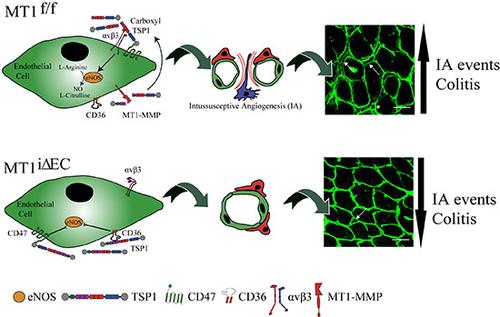当前位置:
X-MOL 学术
›
EMBO Mol. Med.
›
论文详情
Our official English website, www.x-mol.net, welcomes your feedback! (Note: you will need to create a separate account there.)
Endothelial MT1-MMP targeting limits intussusceptive angiogenesis and colitis via TSP1/nitric oxide axis.
EMBO Molecular Medicine ( IF 11.1 ) Pub Date : 2019-12-03 , DOI: 10.15252/emmm.201910862 Sergio Esteban 1 , Cristina Clemente 1, 2 , Agnieszka Koziol 1 , Pilar Gonzalo 1 , Cristina Rius 1, 3 , Fernando Martínez 4 , Pablo M Linares 5 , María Chaparro 5 , Ana Urzainqui 6 , Vicente Andrés 1, 3 , Motoharu Seiki 7 , Javier P Gisbert 5 , Alicia G Arroyo 1, 2
EMBO Molecular Medicine ( IF 11.1 ) Pub Date : 2019-12-03 , DOI: 10.15252/emmm.201910862 Sergio Esteban 1 , Cristina Clemente 1, 2 , Agnieszka Koziol 1 , Pilar Gonzalo 1 , Cristina Rius 1, 3 , Fernando Martínez 4 , Pablo M Linares 5 , María Chaparro 5 , Ana Urzainqui 6 , Vicente Andrés 1, 3 , Motoharu Seiki 7 , Javier P Gisbert 5 , Alicia G Arroyo 1, 2
Affiliation

|
Pathological angiogenesis contributes to cancer progression and chronic inflammatory diseases. In inflammatory bowel disease, the microvasculature expands by intussusceptive angiogenesis (IA), a poorly characterized mechanism involving increased blood flow and splitting of pre-existing capillaries. In this report, mice lacking the protease MT1-MMP in endothelial cells (MT1iΔ EC ) presented limited IA in the capillary plexus of the colon mucosa assessed by 3D imaging during 1% DSS-induced colitis. This resulted in better tissue perfusion, preserved intestinal morphology, and milder disease activity index. Combined in vivo intravital microscopy and lentiviral rescue experiments with in vitro cell culture demonstrated that MT1-MMP activity in endothelial cells is required for vasodilation and IA, as well as for nitric oxide production via binding of the C-terminal fragment of MT1-MMP substrate thrombospondin-1 (TSP1) to CD47/αvβ3 integrin. Moreover, TSP1 levels were significantly higher in serum from IBD patients and in vivo administration of an anti-MT1-MMP inhibitory antibody or a nonamer peptide spanning the αvβ3 integrin binding site in TSP1 reduced IA during mouse colitis. Our results identify MT1-MMP as a new actor in inflammatory IA and a promising therapeutic target for inflammatory bowel disease.
中文翻译:

内皮MT1-MMP靶向通过TSP1 /一氧化氮轴限制肠套叠血管生成和结肠炎。
病理性血管生成有助于癌症进展和慢性炎性疾病。在炎性肠病中,微血管通过肠套叠性血管生成(IA)扩张,这是一种机制不完善的机制,涉及血流量增加和原有毛细血管分裂。在此报告中,在1%DSS诱发的结肠炎期间,通过3D成像评估的内皮细胞中缺乏蛋白酶MT1-MMP(MT1iΔEC)的小鼠在结肠粘膜毛细血管丛中呈现有限的IA。这导致更好的组织灌注,保留的肠道形态和更温和的疾病活动指数。结合活体活体内显微镜检查和慢病毒抢救实验与体外细胞培养相结合,证明血管舒张和IA需要内皮细胞的MT1-MMP活性,以及通过MT1-MMP底物血小板反应蛋白1(TSP1)的C末端片段与CD47 /αvβ3整联蛋白的结合产生一氧化氮。此外,IBD患者血清中的TSP1水平明显更高,并且在小鼠结肠炎期间体内施用抗MT1-MMP抑制性抗体或跨越TSP1中αvβ3整联蛋白结合位点的九聚体肽降低了IA。我们的结果确定MT1-MMP是炎症性IA的新角色,是炎症性肠病的有希望的治疗靶标。
更新日期:2020-02-07
中文翻译:

内皮MT1-MMP靶向通过TSP1 /一氧化氮轴限制肠套叠血管生成和结肠炎。
病理性血管生成有助于癌症进展和慢性炎性疾病。在炎性肠病中,微血管通过肠套叠性血管生成(IA)扩张,这是一种机制不完善的机制,涉及血流量增加和原有毛细血管分裂。在此报告中,在1%DSS诱发的结肠炎期间,通过3D成像评估的内皮细胞中缺乏蛋白酶MT1-MMP(MT1iΔEC)的小鼠在结肠粘膜毛细血管丛中呈现有限的IA。这导致更好的组织灌注,保留的肠道形态和更温和的疾病活动指数。结合活体活体内显微镜检查和慢病毒抢救实验与体外细胞培养相结合,证明血管舒张和IA需要内皮细胞的MT1-MMP活性,以及通过MT1-MMP底物血小板反应蛋白1(TSP1)的C末端片段与CD47 /αvβ3整联蛋白的结合产生一氧化氮。此外,IBD患者血清中的TSP1水平明显更高,并且在小鼠结肠炎期间体内施用抗MT1-MMP抑制性抗体或跨越TSP1中αvβ3整联蛋白结合位点的九聚体肽降低了IA。我们的结果确定MT1-MMP是炎症性IA的新角色,是炎症性肠病的有希望的治疗靶标。



























 京公网安备 11010802027423号
京公网安备 11010802027423号